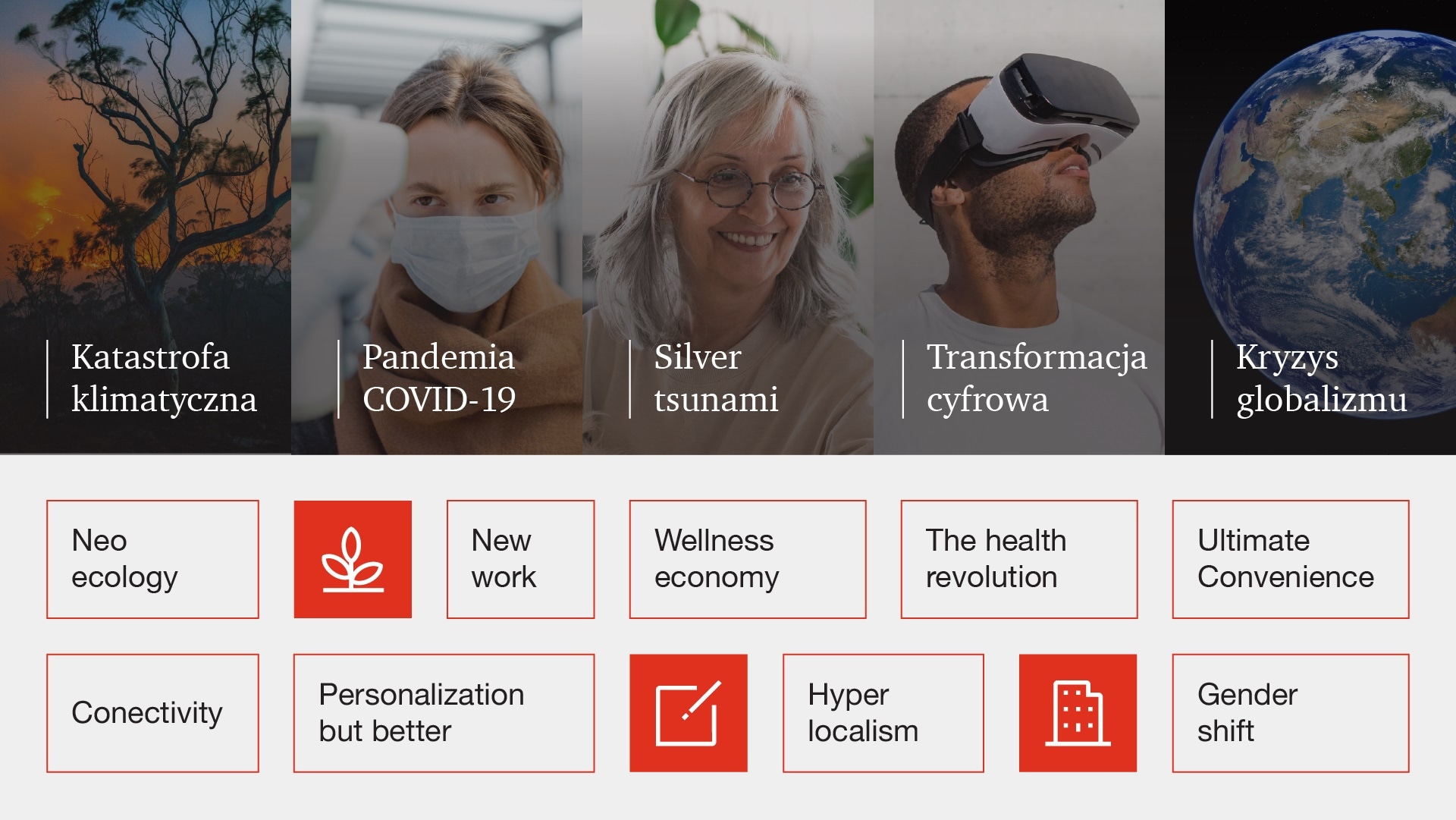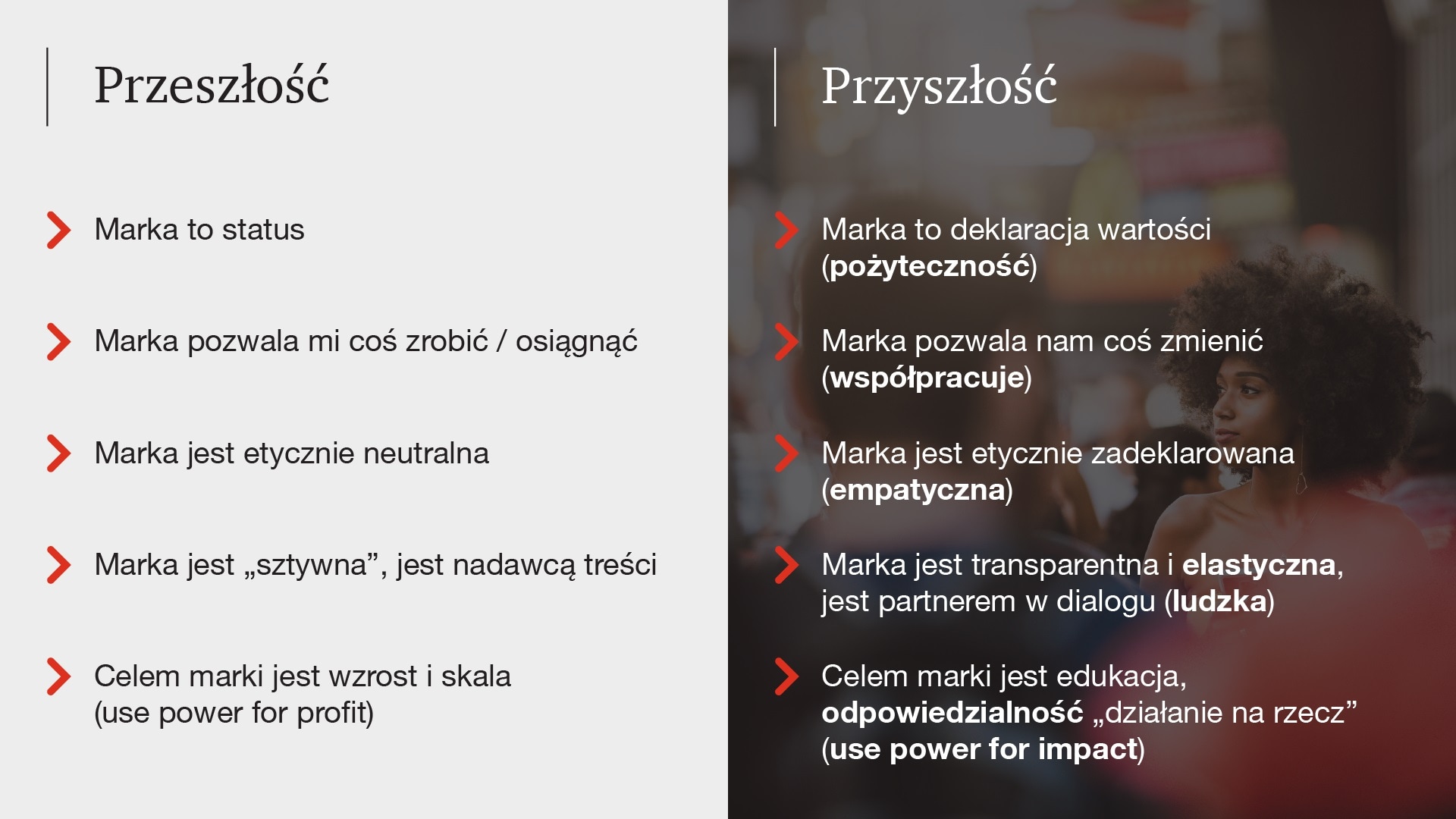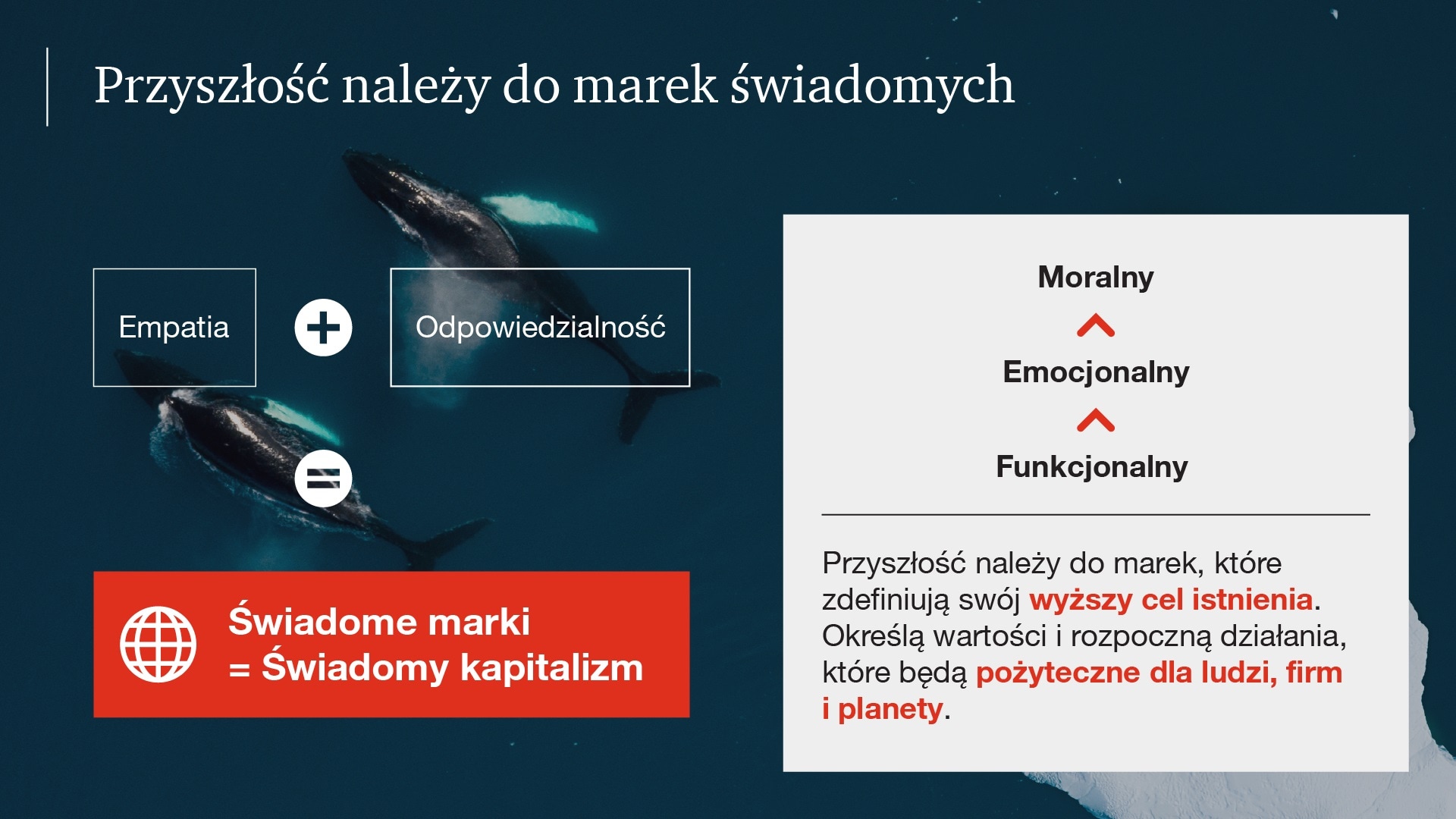{{item.title}}
{{item.text}}

{{item.text}}
Początek roku to czas gdy robimy podsumowania tego co minęło i robimy plany na kolejnych 12 miesięcy. W czasach dynamicznych i dużych zmian, gdy coraz częściej zaczynamy mówić o „nowej normalności” zmianie podlega też myślenie o celu istnienia i sposobach budowania marek. Proponujemy spojrzenie na trendy, które będą miały w najbliższym czasie największy wpływ na kategorie FMCG i usługi.
Katastrofa klimatyczna i jej konsekwencje są odczuwalne już niemal na co dzień i na każdym kroku – nie ma więc odwrotu i marki, które chcą przetrwać muszą uwzględnić w swoich działaniach elementy rzeczywistych zmian na rzecz ekologii, takich jak budowanie gospodarki obiegu zamkniętego, „zero waste”, korzystanie z odnawialnych źródeł energii czy neutralność pod względem emisji CO2. Konsumenci są coraz bardziej świadomi i wyczuleni na punkcie uczciwości producentów. Coraz częściej sprawdzają czy marki realizują swoje obietnice oraz czy proponowane rozwiązania są realną zmianą czy tzw. „greenwashingiem” (czyli komunikacją marketingową przedsiębiorstwa, bazującą na fałszywych lub wprowadzających w błąd deklaracjach, dotyczących zgodności produktu lub jego elementów z zasadami ochrony środowiska). Producenci żywności dodatkowo muszą wziąć odpowiedzialność za sposoby w jakich produkowana jest żywność np. poprzez wycofywanie się z masowej hodowli zwierząt na rzecz rozwijania żywności roślinnej, redukowanie toksycznych nawozów i środków chemicznych oraz czyszczenie receptur produktowych.
Od 2 lat niemal wszyscy doświadczamy zupełnie nowego stylu pracy – co możliwe wykonujemy pracując z domu, komunikując się on-line, redukując ilość niezbędnych kontaktów i podróży. Zamieniamy domy w biura albo szukamy opcji, by pracować zdalnie z różnych stron świata, łącząc pracę z wyjazdami o charakterze wakacyjnym. Granice tego co jest i nie jest miejscem pracy stają się coraz bardziej płynne. Bez zewnętrznych ram wielu z nas rozmywa się też granica między czasem pracy i odpoczynku. Coraz śmielej na rynek pracy wchodzi automatyzacja i roboty (np. darkstores, samoobsługowe kasy, AI wydzwaniająca z ofertami fotowoltaiki czy roboty-przewodnicy na lotniskach). Te zmiany wymuszają na coraz większej grupie ludzi odpowiedź na pytanie gdzie i jak chcą w przyszłości pracować oraz co muszą zrobić by nabyć nowe kompetencje. Zmiana stylu pracy, pociąga za sobą zmianę stylu życia i sposobów na zaspokojenie potrzeb konsumenckich, co powinno wzmóc czujność producentów szukających rynkowych szans.
Wiek już w niewielkim stopniu jest definiowany przez rok urodzenia, a znacznie bardziej przez pryzmat tego na ile lat „się czujemy” i na ile lat „wyglądamy”, wiek staje się stanem umysłu a nie liczbą wynikającą z kalendarza. Większości z nas zależy, by jak najdłużej utrzymać sprawność i zdrowie – stąd coraz większy nacisk na profilaktykę i prewencję zamiast leczenia oraz maksymalizację potencjału naszego umysłu i ciała poprzez codzienne dbanie o jego potrzeby (sen, odpoczynek, relaks, aktywność fizyczną czy odżywianie). Coraz więcej osób stara się osiągnąć ten cel podchodząc do kwestii zdrowia holistycznie, czyli z jednakową uważnością i troską dbając zarówno o dobrostan psychiczny jak i fizyczny, łącząc osiągnięcia nauki z mądrością medycyny naturalnej. Pandemia COVID-19 wymusiła na nas zmiany w stylu korzystania z usług lekarzy – silnie rozwinęła się telemedycyna i kontakty on-line podczas diagnozy i leczenia. Te zmiany są ogromną szansą dla wielu producentów i usługodawców z obszarów produkcji żywności, suplementów, dietetyki, kosmetyki, odzieży sportowej czy propozycji na spędzanie wolnego czasu.
Jesteśmy zmęczeni nadmiarem, przebodźcowani, odczuwamy negatywne skutki bycia w ciągłym podłączeniu do sieci i konieczności natychmiastowego reagowania na rosnącą ilość kontaktów i powiadomień. Czujemy się zmuszani by dopasowywać się do zoptymalizowanych algorytmów obsługujących nas w coraz większej ilości instytucji, sklepów on-line czy na infoliniach. Coraz częściej marzymy o deprywacji, odcięciu się i ucieczce. W odpowiedzi na te potrzeby rośnie ilość propozycji które pomogą nam zwolnić, zredukować, zmniejszyć i zrobić „detoks” dla ciała i ducha. Poszukujemy nowej duchowości, odkrywamy emocje, pielęgnujemy doznania, chcemy jeść mniej ale to co jest naprawdę wartościowe dla naszych organizmów, zatrzymujemy się na tym co drobne, ćwiczymy uważność. Czujemy, że różnimy się od maszyn, i choć doceniamy technologiczne usprawnienia, szukamy przestrzeni i sposobów, gdzie możemy pozostać ludźmi. To szansa dla marek, których celem jest zaspokajanie kluczowych ludzkich potrzeb – bycia w kontakcie, bliskości, budowania relacji, odpoczynku czy relaksu.
Wygoda to jedna z potrzeb, która jest siła napędową wielu marek i innowacji produktowych. Obecnie możemy obserwować wysyp rozwiązań, które mają maksymalizować wygodę konsumentów – zakupy w godzinę a nawet w 15 minut, paczkomat czy punkt odbioru i nadania przesyłek na każdym rogu, zakupy on-line i bezobsługowe, dostawa pod wskazany adres na określoną porę, subskrypcje usług i diety pudełkowe. Takie rozwiązania zmieniają styl życia osób, które mają do nich dostęp – inaczej planują zakupy, inaczej podejmują decyzje odnośnie tego co, gdzie i kiedy będą jadły, powodują, że konsumenci otrzymują ofertę spersonalizowaną i na żądanie. Marki które działają w obszarach maksymalizacji wygody muszą dysponować bardzo precyzyjną wiedzą na temat swoich konsumentów.
Życie przeniosło się do Internetu – tam wielu z nas pracuje i uczy się, odpoczywa, korzysta z różnorodnej rozrywki – nawet takiej, która przed pandemią realizowana była stacjonarnie np. zajęcia fitness i jogi, kursy kulinarne czy odwiedziny w galeriach i muzeach. Coraz więcej spraw urzędowych możemy załatwić nie wychodząc z domu czy to na stronach urzędów, rządowych czy w przychodniach i na portalach pacjenta. Marki, które kiedyś miały swoich konsumentów i użytkowników teraz korzystając z możliwości jakie daje on-line i używając omnichannelowej komunikacji gromadzą wokół siebie społeczności swoich fanów, którzy doceniają nie tylko ich produkty czy usługi, ale całe spektrum działania i bycie w nieustannym, bezpośrednim kontakcie z odbiorcami. Konsumenci nie są już bierni, ale dzięki bezpośrednim dialogom z markami mają poczucie bycia w kontakcie, większego wpływu i przepływu wartości. Jeśli komunikacja jest sprawna a wartości i sposoby ich wcielania w życie wspólne dla marki i jej społeczności – zwiększa się przywiązanie i lojalność, konsument nie kupuje jedynie produktów a manifest wartości, z którymi chce być identyfikowany.
Marki zmieniają swoje podejście do odbiorców, których przestają rozumieć wąsko jako konsumentów dóbr, a zaczynają postrzegać jako różnorodnych ludzi. Zaczynają rozumieć, że konsument to twór masowy o uogólnionych potrzebach, a do człowieka trzeba podchodzić indywidualnie, z uwzględnieniem jego osobistych potrzeb. Stąd marki rozbudowują ofertę produktów i usług personalizowanych, tworzonych w kontakcie z odbiorcą np. Nike, który umożliwia samodzielne zaprojektowanie butów czy Nutella, która zachęca do stworzenia własnej etykiety. Ofertę produktową uzupełniają o różnego rodzaju usługi np. aplikacje i narzędzia do monitoringu, dzięki czemu doświadczenie kontaktu z marką rozszerza się na on-line i off-line. Szersza gama doświadczeń oferowanych przez marki przekłada się na wzmocnienie lojalności.
Trend na lokalność pojawił się już kilka lat temu, ale pandemia i wynikające z niej ograniczenia wyraźnie pokazały negatywne skutki i ryzyka nadmiernie rozbudowanych łańcuchów dostaw. Okazuje się, że często awokado czy liczi, które kupujemy w Biedronce, a następnie wyrzucamy, bo okazało się niesmaczne lub popsute, odbyło podróż wokół Ziemi dłuższą niż jego konsument w całym swoim życiu. Świadomi konsumenci widząc absurd tej sytuacji zwracają się ku produktom lokalnym i sezonowym, które są bezpieczniejsze i zdrowsze nie tylko ze względu na fakt, że szybciej trafiają na nasze stoły ale też nie muszą być na czas dalekiej podróży zabezpieczane dużą ilością chemikaliów. Straciliśmy zaufanie do masowych producentów, bo wiemy, że ich głównym celem jest zysk – podczas gdy lokalny piekarz czy rolnik aby utrzymać swoich Klientów musi poza jakością produktów wykazać się transparentnością i odpowiedzialnością. Wracamy do tego co proste, bliskie, dostępne bezpośrednio i od ludzi, z którymi mamy bezpośredni kontakt, bo dzięki relacjom odzyskujemy zaufanie do jakości oferowanych produktów i usług.
Coraz wyraźniej w przestrzeni publicznej przebija się głos kobiet i mniejszości. To reakcja na fakt, że świat zbudowany przez pryzmat potrzeb i oczekiwań białych mężczyzn i patriarchalnych zasad nie widzi odmienności i różnorodności. Kobiety i przedstawiciele mniejszości dochodzą swoich praw i domagają się wzięcia pod uwagę ich perspektyw, bo świat uwzględniający różnorodność jest nie tylko światem bardziej sprawiedliwym i zrównoważonym ale także bardziej opłacającym się ekonomicznie. Okazuje się bowiem, że koszty jednostronnego spojrzenia i wynikających z tego strat społecznych (np. opracowywanie receptur leków na bazie wyników mężczyzn powoduje, że są one nieskuteczne dla kobiet a projektowanie pasów bezpieczeństwa na manekinach męskich skutkuje większą ilością poważnych i kosztownych w leczeniu wypadków wśród kobiet) pogarszają jakość życia całych społeczeństw, czyli też białych mężczyzn.
Świat zmienia się coraz szybciej a przyszłość zaczyna się dzisiaj i należy do marek, które zdefiniują swój wyższy cel istnienia. Określą wartości i rozpoczną działania, które będą pożyteczne dla ludzi, firm i planety. Marki przyszłości są deklaracjami wartości (pożyteczności), pozwalają nam coś zmienić (współpracują), są etycznie zadeklarowane (empatyczne), są transparentnymi i elastycznymi partnerami w dialogu (są ludzka) a ich celem jest edukacja, odpowiedzialność i „działanie na rzecz” (use power for impact).
{{item.text}}

{{item.text}}



